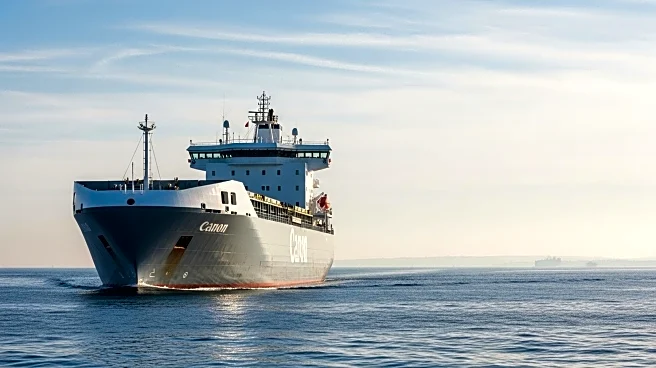What is the story about?
What's Happening?
The Chinese government has announced amendments to its 2001 International Maritime Transport Regulations, a move widely seen as a response to the U.S. Trade Representative's plan to impose fees on Chinese-built, owned, or operated vessels calling at U.S. ports. The U.S. fees are set to begin in mid-October, targeting Chinese-flagged operators, ships owned by Chinese investors, and ships built by Chinese shipyards. The changes in Chinese regulations include potential countermeasures against countries imposing discriminatory bans or restrictions on Chinese maritime operators. These countermeasures could involve charging special fees to ships from such countries berthing at Chinese ports, restricting their entry or exit, and limiting access to data related to China's international maritime transport.
Why It's Important?
The amendments to China's maritime regulations highlight the escalating trade tensions between the U.S. and China, particularly in the maritime sector. The U.S. fees are a response to complaints from unions about China's dominance in shipbuilding and maritime trade, which the U.S. deems unfair. The situation could impact global shipping operations, with major carriers like COSCO Shipping and OOCL acknowledging potential business impacts. International carriers are adjusting deployments to avoid fees, indicating potential disruptions in global shipping routes. The regulatory changes could also lead to legal challenges, affecting international trade dynamics and economic relations between the two countries.
What's Next?
As the U.S. prepares to implement the fees, the USTR and Customs and Border Protection are expected to release documentation detailing the fee structure. The situation remains fluid, with industry stakeholders awaiting clarity on the rules and potential legal challenges. International carriers are strategizing to minimize the impact, while investors and vessel owners are considering responses to the evolving fee structure. The developments could further complicate trade negotiations and impact maritime operations globally.
Beyond the Headlines
The regulatory changes by China could have long-term implications for international maritime law and trade practices. The situation underscores the complexities of global trade relations and the potential for regulatory measures to influence economic policies. The amendments may also affect the strategic positioning of maritime operators and the future of international shipping agreements.

















